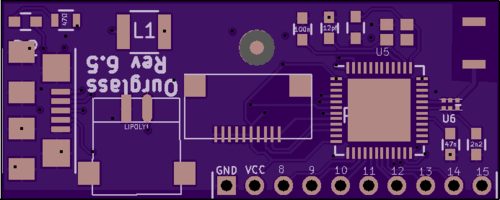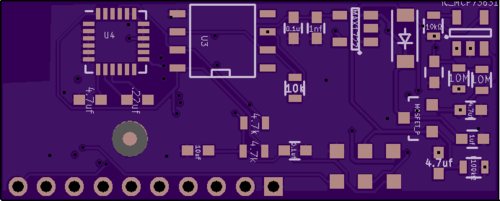v6, maybe we'll make a few
So, it’s been a while since I bothered to document anything, but if you’ve been following the git repo, you’d know that the work continues apace. v5 has come and gone; I made substantial changes to the layout, built a version with working pushbuttons, and wore it for a while there. Then, life caught up with me and I didn’t work on anything fun for a while, but now I’m back at it.
One day, while I was contemplating if I should add yet another feature, I thought that it really sucks that to add any features I have to change the board layout, wait two weeks for a board, and then see if what I’ve done actually works. Then I thought, why don’t I just break out a bunch of GPIOs and make Ourglass like a dev kit? That’s how v6 was born.


I’ve shared the new boards on OSHpark for the curious. Version 5 was an incremental improvement on 4, but rebuilt from scratch. All of the parts were moved around, and some features with interrupts were added. Version 6 is based on version 5, but the l-shape has been changed to a rectangle, the expansion header added, and now the design is double sided.
The sharp-eyed may notice a few other things: there are test points and fiducials on this version. Version 6.5 is the first pass at making Ourglass production ready. I’d like to produce somewhere between 200-1000 boards, which seems to be a sweet spot for this kind of run. If I’m selling just the board (no battery, no screen, and no case) they’d cost about $60 in that quantity (to buy; manufacturing cost is about half that). With battery, case, and screen, it’s more like $100. This would have to be a limited run, since to make a real commercial product I’d also have to have FCC certification. I could see doing 1000 at a time, though. Crowdsupply or Massdrop, with a laminate case, similar to the early prototypes. Notably, you can get silicone laser cut to spec; I think that would be really interesting.
Also a part of the work of getting to a product: Getting the software toolchain up and running. Out of the blue, around the beginning of December, someone from the Apache Mynewt project reached out to me. They have a fully open-source RTOS based on the NRF51/52 including bluetooth stack. There’s no compatibility with Arduino, which was a goal of mine, but I think there are two ways to go with that: either write a bunch of tutorials for working with MyNewt in the openocd toolchain, or figure out what’s needed to build a compatibility layer. I think both are doable.
In an ideal world, you’d be able to upload a program over USB or BTLE from the Arduino IDE; this lowers the bar for beginner-level entry. Then, for advanced users, the source for the whole stack is available, and it can be programmed over SWD. My bet is that most users will want to tweak a little, and some people will want to build a whole interface from the ground up. I want Ourglass to be a platform that enables that kind of experimentation.
Posted by Matt on 2017-01-23 19:09:36 +0000